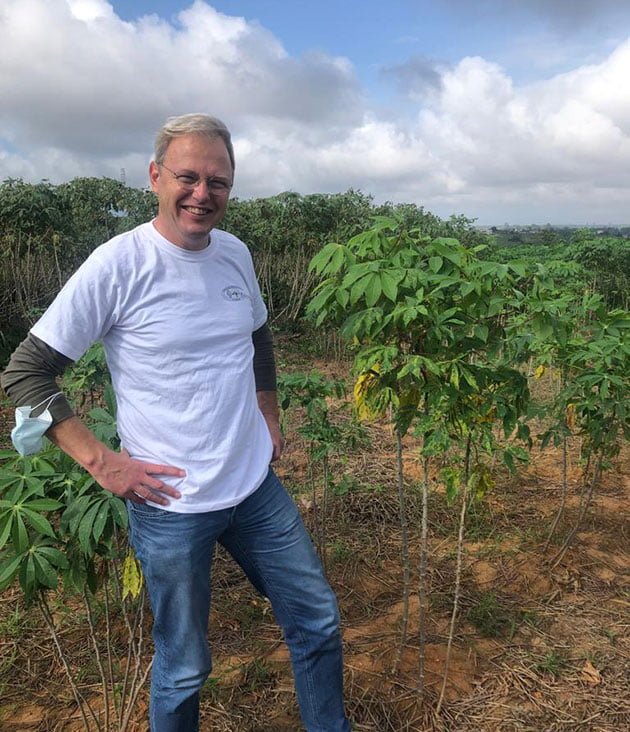Physical Address
304 North Cardinal St.
Dorchester Center, MA 02124
Physical Address
304 North Cardinal St.
Dorchester Center, MA 02124


WAGENINGEN, Netherlands, Feb 01 (IPS) – The 500 per cent increase in global agricultural productivity over the past 60 years has largely been made possible by the scientific advances of the “Green Revolution” – from the ability to breed higher yielding varieties to improvements in farm inputs, especially fertiliser.

To address this, scientists are embarking on a new frontier of the Green Revolution, built on fresh understanding about soil microbes and crop biology. This offers the potential for a “genetic revolution” that enables agricultural production without the need for as much costly chemical fertiliser use.
The genetic revolution is partly born of a need to address the fact that the gains of the Green Revolution in the 1960s were not evenly spread. Smallholder farmers in sub-Saharan Africa continue to have limited access to the latest varieties of planting material and fertiliser, while contending with some of the most degraded soil in the world.
Rene Geurts of Wageningen University visiting a smallholder farmer’s cassava field near Abidjan, Cote d’Ivoire in October 2022. Credit: Christian Rogers/ENSA
Meanwhile in Africa, key staple crops such as cassava have not yet fully benefited from the progress in modern breeding technologies.
Recent advances in scientific knowledge about how crops interact with soil bacteria and fungi to obtain nutrients therefore offer the opportunity to optimise plant biology to reduce the need for fertiliser, helping to solve both agriculture’s environmental challenges and the inequality that has held back food security in Africa.
It also happens that cassava, Africa’s most important crop after maize, is the perfect starting point for a next chapter of agricultural science and innovation.
In the evolution of crop species, cassava narrowly missed the opportunity to develop the same natural ability as legumes to interact with soil bacteria to convert nitrogen from the air. Legumes engage with rhizobia in soil to naturally fix nitrogen, meaning beans, peas and lentils do not need synthetic nitrogen fertiliser to grow.
While cassava did not evolve with this trait, the root crop does make good use of arbuscular mycorrhizal fungi, a soil fungus, to source mineral nutrients such as phosphate. The biological system that allows cassava to interact with arbuscular mycorrhizal fungi was the evolutionary ancestor of nitrogen fixation.
This makes cassava something of a stepping stone between legumes, which do not need nitrogen fertiliser, and other crops, which currently rely on artificial sources of nutrients.
Scientists including those of us at the Enabling Nutrient Symbioses in Agriculture (ENSA) project are investigating the possibility of using cassava’s existing mechanism for engaging with fungi to also interact with bacteria to fix nitrogen.

This research is at a very early stage but increasing the ability of more crops to source nutrients organically without the need for fertiliser would in theory have multiple benefits.
Such a development would help improve the uptake of crop nutrients, which would translate into increased growth and higher yields. This is particularly valuable for African farmers, who have seen cassava yields remain stagnant since the 1960s.
Pursuing the development of nitrogen-fixing cassava could also lead to reductions in the need for fertiliser, which would help bring down agricultural emissions while unlocking productivity gains in regions otherwise limited by access to fertiliser. This would mean smallholder farmers in Africa could benefit from yield increases similar to those achieved elsewhere in the Green Revolution.
Finally, if scientists can introduce the trait to fix nitrogen to cassava, it opens the possibility of translating it to other, related crop species.
Researchers are at the start of their exploration of this new frontier but the potential of a “genetic revolution” is ultimately for a “doubly green revolution” that accelerates agricultural intensification without the need for chemical fertiliser.
Not only would this help to feed a growing population more sustainably, but it would also level the playing field for those who have been historically left behind by agricultural innovation.
Rene Geurts, Associate Professor, Wageningen University, and principal investigator at the Enabling Nutrient Symbioses in Agriculture (ENSA) project
IPS UN Bureau
Follow @IPSNewsUNBureau
Follow IPS News UN Bureau on Instagram
© Inter Press Service (2024) — All Rights ReservedOriginal source: Inter Press Service